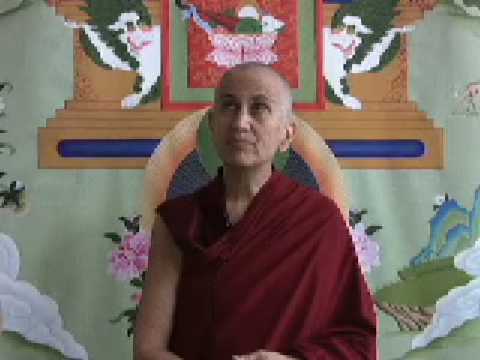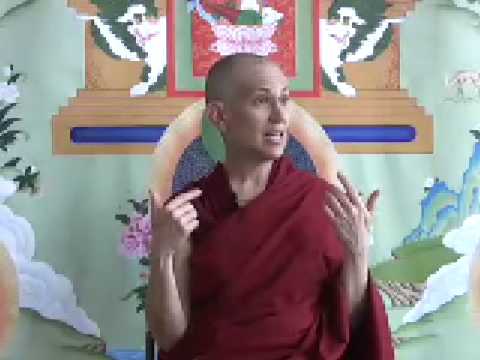Fear of dying
Fear of dying
A series of talks on the many aspects of of our lives that we may have fear towards—death, identity, the future, health, the economy, loss, separation, and more; touching also on the wisdom of fear and the different antidotes to ease our fears.
- Review of panicky fear and wisdom fear
- Most people have a panicky fear of death
- People who understand the Dharma properly have a wise concern about death
Fear 04: Dying (download)
Okay so, I thought that I’d say something about the fear of death today. Because we talked about the wisdom fear the preceding day and then we also talked about the panicky fear and the difference. Wisdom fear being, let’s see, of lower rebirth or merging on the highway. Panicky fear the way we have despair and distress when we hear worldly events. So the fear of death, you know, because it’s talked about in the Dharma teachings a lot.
Panicky View of Death
We meditate on death and we have to be very clear when we do this meditation what the correct conclusion of it is. Because people who don’t know the Dharma fall into the panicky fear of death, and people who do understand the Dharma properly go to the wise concern about death, okay? And it’s very important we discriminate the two, and not just assume that because we’re Dharma practitioners we automatically understand the meditation properly. Because we don’t always, okay? And I’ve seen it happen; people meditate on death and then they’re just sobbing afterwards because they’re thinking of their family dying, they’re thinking of their own death, they’re thinking of their friends dying and they’re just so filled with feelings of loss and grief and then they say “Well, how come the Buddha tells us to meditate on death? How is that going to help my practice?” Well that’s because they are doing the meditation incorrectly and reaching the wrong conclusion. Because that kind of grief, and sometimes fear of death that can come from that, is all stemming from attachment, okay? It’s very clear attachment to my life, attachment to the people I love, you know. It’s based on the view of permanence, on people being permanent, on people never ceasing to exist. And so, when the reality of even that gross impermanence hits them in the face or when they even think of it, then they fall into fear or despair. So you can see very clearly that fear and despair is based on attachment, and it’s not a Dharma perspective and it’s not at all helpful in our Dharma practice.
The Dharma view of death
Now, being ordinary beings, sometimes that fear or that grief comes up, okay? But what we have to do when it does is not just fall prey to it, but really learn to think about death from the Dharma viewpoint. So that we can adjust our mind and so that our mind has a correct view about death and doesn’t just fall into all of that attachment, worldly grief and so on; which actually takes you away from your spiritual practice because you’re too busy crying. So we don’t say we’re wrong when we have it, you can’t just stop those feelings, but when they come up rather than indulge in them we have to stop and think about what the correct way to view death is, and what the correct meditation on death is, okay? So it’s very important.
And the correct way to view death and to meditate on death is that we do it for the purpose of understanding the incredible opportunity that we have with this life to practice the Dharma. How short this life is, how short this opportunity is, and therefore it’s important that we make use of it and we don’t waste it doing silly things, okay? That’s the purpose of the meditation on death in Buddhism; so that we make our minds and our lives very vivid, okay? Because with attachment, we tend to live on automatic and we’re spaced out. When we have an awareness of death, our life is so alive because we really cherish every moment and we’re making use of every moment and we’re not just spacing out, lulling into this thing of living on automatic as we take everything for granted, okay? So if we meditate on death in this proper way we really see; “Oh, death is definite.” That means I’m going to die, that means the people I love and I know are going to die. And that’s the reality, okay? So why am I crying over reality? Shouldn’t reality be liberating? Okay so, that doesn’t mean that we’re liberated when people die, I’m not talking about that. But if we understand death properly, knowing that reality, that liberates our mind from taking our life for granted, from reifying other people and ourselves and making them permanent. It frees us from all this grief and despair, okay? Because we’re just seeing: “This is the reality,” and it really motivates us to want to practice to attain liberation from samsara. Because liberation is called the deathless, okay? Referring to those of us bound in samsara we are the deathful, aren’t we? Because we die again and again and again and again and that’s one of the big sufferings of samsara. Seeing that ordinary way of death was one of the things that propelled the Buddha to leave the palace and search for the truth. So seeing death as a reality of our lives, but knowing that death in samsara is fuelled by ignorance, and afflictions, and karma. Then, when we are aware of death we get the strong intention to free ourselves from ignorance, afflictions and karma, okay? That leads to the renunciation of samsara; the determination to be free. And that puts us on the path in a very strong clear way so that we don’t get deterred by all the glitter of things that seem pleasant and seem permanent but just contribute to being spaced out. Okay?
Thinking about death
So, spend some time thinking about what’s the worldly fear of death, what is a Dharma concern with death. And look in your own mind and, when do you have the worldly fear of death? And trace back where it comes from; really look at that very clearly. Where does that fear of death come from? Where does that grief about death come from? Okay? And then look at the Dharma view and see how it can fuel your practice. Because basically with the Dharma concern about death, if we’re afraid, we are afraid of the ordinary fear of death. Okay? Because we realize if we don’t practice, at the time of death we’re going to have the ordinary fear of death and our mind is going to be freaked out and we don’t want that. So therefore we have to practice now. Okay? So we don’t buy into that ordinary fear, we see it as something that an awareness of death will help us to overcome by pushing us to practice, or inspiring us to practice. Okay? And then whenever somebody around us dies, whether it’s a bug or whether it’s somebody we care about, actually if we are really practicing well we even care about the bugs, but we look at it all as a teaching. Reminding us of our own mortality and of the importance of practicing to free our mind from attachment, free our mind from ignorance, purify the karma. Okay?
Venerable Thubten Chodron
Venerable Chodron emphasizes the practical application of Buddha’s teachings in our daily lives and is especially skilled at explaining them in ways easily understood and practiced by Westerners. She is well known for her warm, humorous, and lucid teachings. She was ordained as a Buddhist nun in 1977 by Kyabje Ling Rinpoche in Dharamsala, India, and in 1986 she received bhikshuni (full) ordination in Taiwan. Read her full bio.


